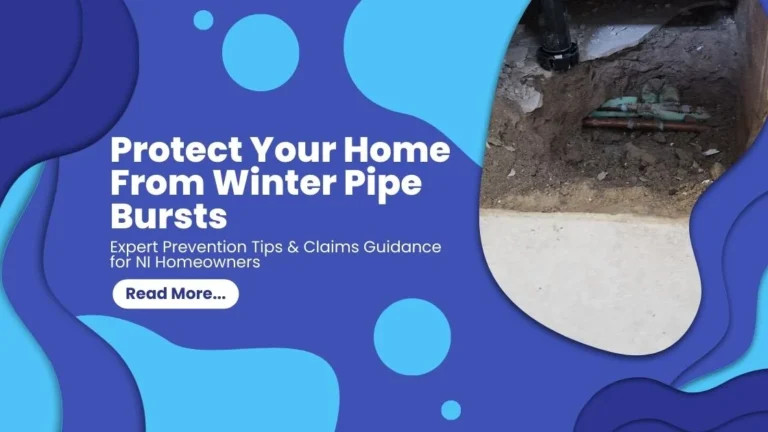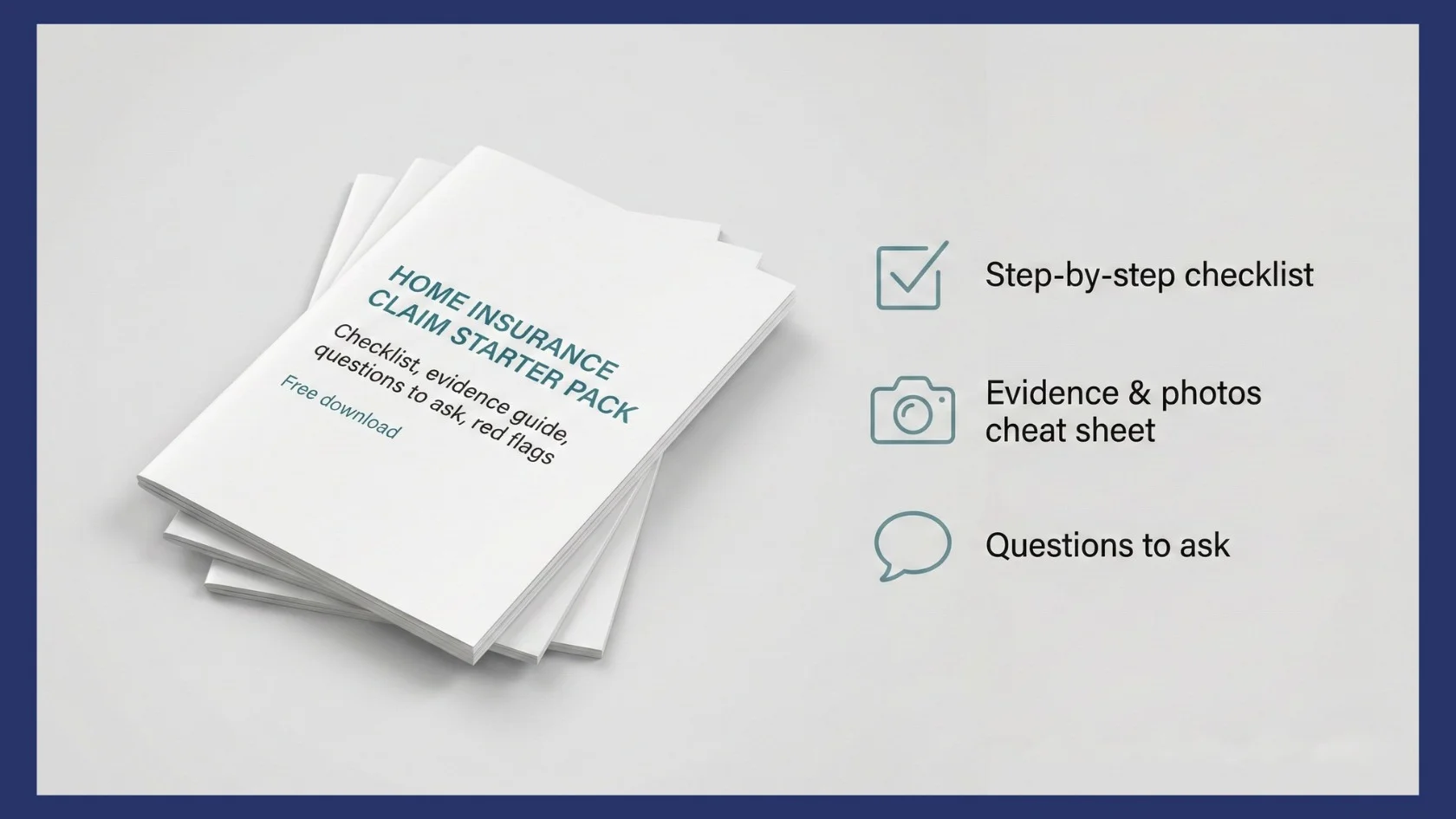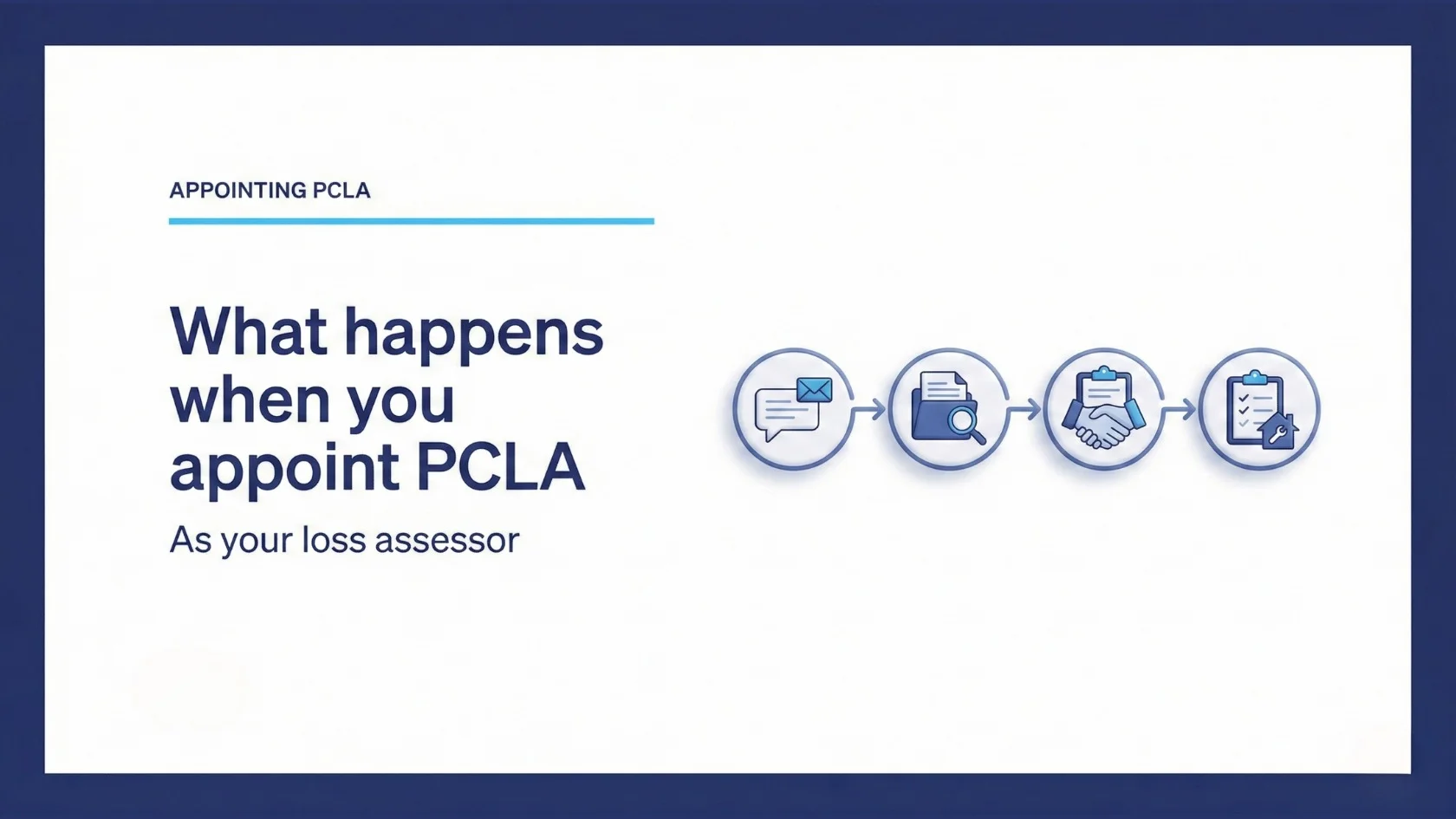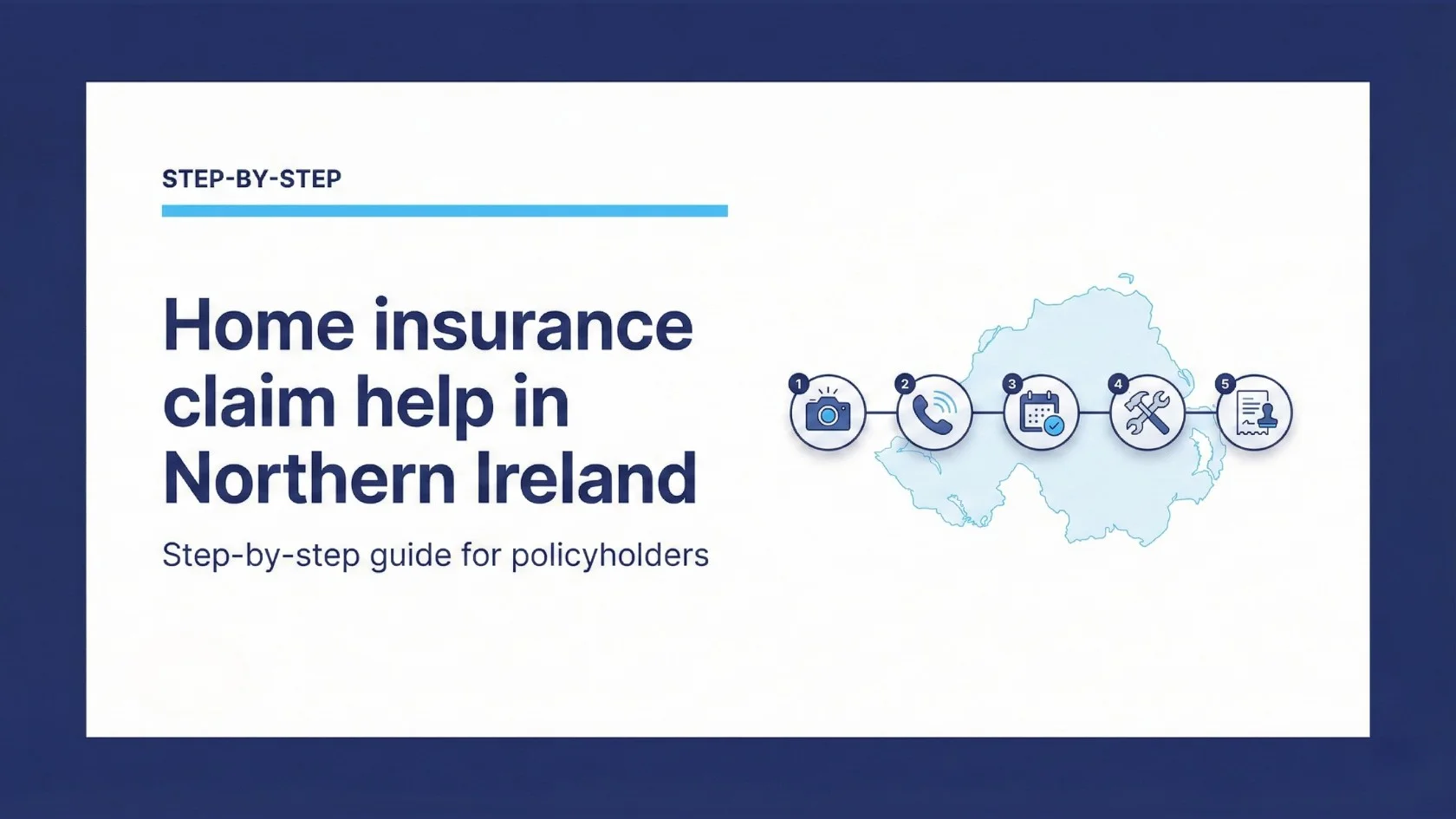As temperatures drop, the risk of pipes bursting in homes across Northern Ireland increases, leading to potential water damage and hefty repair bills. Your home’s particularly at risk if it’s in an exposed area or if you’ve got uninsulated pipes in your loft. Being prepared and taking preventive measures can safeguard both your property and finances.
We’ve put together some practical tips to help you protect your home from the winter chill and guide you through making an insurance claim if things go wrong.
Understanding the Risks: Why Winter Poses a Threat to Pipes
When water freezes, it expands—meaning that when temperatures dip, any water left in exposed or unprotected pipes may freeze and swell, leading to the pipe cracking or bursting. Once the pipe thaws, the result can be flooding, potentially causing thousands of pounds worth of damage to property, furniture, and personal belongings.
In Northern Ireland, where temperatures can plummet during harsh winters, these issues are all too common. For instance, the big freezes of 2010 and 2022 brought widespread property damage and high insurance claim rates. During these years, we at Property Claims Loss Assessors (PCLA) assisted hundreds of homeowners, particularly in affected areas like Newry, Derry, Armagh, and Downpatrick. Many homeowners returned from Christmas holidays to find their homes devastated, with burst pipes that had thawed and flooded their attics, causing major structural and interior damage.

Prevention Strategies: Protecting Your Home and Pipes This Winter
1. Insulating Pipes and Vulnerable Areas
One of the most effective ways to prevent pipes from freezing and bursting is to insulate them properly. Pipes located in unheated or poorly insulated areas—such as attics, garages, basements, and crawl spaces—are most vulnerable. Insulating these areas, as well as the pipes themselves, can significantly reduce the risk of freezing. Here’s how to do it effectively:
- Use Foam Pipe Insulation: Affordable and easy to install, foam pipe insulation can cover pipes and prevent heat loss. Ensure that all exposed pipes, especially in unheated areas, are thoroughly wrapped.
- Insulate Attic Spaces: Adding insulation to your attic can help maintain a stable temperature throughout your home, reducing the likelihood of pipes freezing.
- Check for Gaps and Cracks: Small cracks around windows, doors, and walls allow cold air to enter. Sealing these gaps with caulking or weather stripping can help maintain warmth in vulnerable areas.
Related: Attic Water Damage: How A Small Drip Turned Into A Big Problem
2. Maintaining a Consistent Indoor Temperature
Keeping your home’s temperature consistent, even when you’re away, is crucial in avoiding frozen pipes. During the 2010 and 2022 freezes, we noticed that many homeowners had turned off or significantly lowered their heating while away for the holidays. Unfortunately, this lack of consistent heating led to widespread damage.
- Set the Thermostat to a Minimum Temperature: When you’re away, set your thermostat to at least 12-15°C to prevent pipes from freezing. It may cost a little extra in heating, but it’s a small price to pay compared to potential water damage.
- Use Smart Thermostats: A smart thermostat allows you to monitor and control your home’s temperature remotely, providing peace of mind when you’re not at home.
- Keep Attic Hatches Open: Leaving the attic hatch open during extremely cold periods can let the warm air from inside the home travel up to the attic and help to prevent any pipes freezing.
3. Dripping Taps to Relieve Pressure
In very cold weather, letting taps drip slightly can help prevent pipes from freezing. A small trickle of water relieves pressure in the pipes, meaning that even if a pipe does freeze, the risk of it bursting is reduced. This method is particularly effective for taps connected to exposed or vulnerable pipes.
Warning Signs of Frozen Pipes: When to Act Quickly
Frozen pipes often present warning signs before they burst, so early detection is key. Here are some signals to watch out for during a cold snap:
- Low Water Pressure: If your water pressure suddenly drops, especially in cold weather, it may indicate that a pipe is frozen. Try turning on other taps to see if the problem is isolated or widespread.
- Frost on Pipes: Visible frost on exposed pipes, especially in attics or unheated spaces, is a sign that the pipe is close to freezing.
- Odd Smells from Drains: If a pipe is frozen, it can create a vacuum effect, leading to unusual smells from drains. This can indicate trapped water or ice buildup in the plumbing system.
If you notice any of these signs, act fast. Turn off the water supply to the affected area, and consider calling a plumber to assess the situation before it worsens.
Dealing with the Aftermath: How PCLA Supports Homeowners Through Insurance Claims
If a pipe does burst, dealing with the aftermath can be overwhelming. At PCLA, we understand that homeowners in Northern Ireland may feel lost or unsure about the insurance claim process, which is why we’re here to help. With over 30 years of experience, our team of building surveyors and insurance professionals help homeowners by ‘Turning Stress into Success‘ and ensuring they receive their full entitlement for repairs.
1. Immediate Steps to Take After a Burst Pipe
When a pipe bursts, swift action is essential to minimise damage and protect your claim eligibility:
- Turn Off the Water Supply: Shutting off the main water valve will prevent additional flooding and damage.
- Document the Damage: Take clear photos and videos of the affected areas, as this documentation will be critical when filing an insurance claim.
- Remove Valuables from the Area: Move any personal belongings or valuables away from the flooded area to prevent further damage.
- Call Your Insurer Promptly: Notifying your insurer as soon as possible will help start the claims process and ensure timely assessment and repairs.
2. How PCLA Assists in Managing Your Claim
Managing an insurance claim after a burst pipe can be complex, as insurers may scrutinise whether preventative measures were taken. Our role at PCLA is to act on behalf of homeowners, liaising directly with insurers to handle all aspects of the claim. Here’s how we help:
- Comprehensive Damage Assessment: Our team conducts a thorough inspection of your property, assessing both visible and hidden damage to ensure nothing is overlooked in the claim.
- Ensuring Full Entitlement: We work to make sure homeowners receive the full compensation they’re entitled to under their insurance policy, which can cover structural repairs, water damage remediation, and replacement of damaged items.
- Coordinating Emergency Repairs: In cases like the 2010 and 2022 freezes, we coordinated emergency electrical repairs and the installation of dehumidifiers to stabilise properties and prevent further damage.
By having a dedicated loss assessor on your side, you can have peace of mind that your claim will be handled efficiently and that your home will be restored as quickly as possible.
3. Lessons from the Big Freezes of 2010 and 2022
Our experiences during the extreme winters of 2010 and 2022 highlighted some common pitfalls that can complicate claims. Many homeowners were unaware that their attic pipes were vulnerable, and they had left their heating systems off while away for the holidays, unknowingly exposing their homes to risk.
For instance, during the 2010 freeze, homeowners in Newry and Derry faced extensive damage when pipes burst in their attics. The pipes initially froze due to the sudden temperature drop, but when they thawed, water flooded the properties, many of which were unoccupied over Christmas. PCLA worked tirelessly over the holidays to assist these families, arranging for immediate emergency repairs and helping them file claims that ultimately covered millions in damage costs.
Preparing for Winter: A Final Checklist
Before the freezing weather hits, Northern Ireland homeowners can take the following steps to ensure they’re prepared:
- Insulate All Vulnerable Pipes and Attic Spaces: Prevent freezing with adequate insulation.
- Maintain a Steady Heating Temperature: Set a minimum temperature to avoid freezing pipes.
- Check Insurance Policy Details: Ensure your coverage includes burst pipes and water damage.
- Know Where Your Main Water Valve Is: In an emergency, you’ll want to be able to shut off your water supply quickly.
- Consider a Smart Thermostat: Monitor your home’s temperature even when you’re away.
Protecting Your Home from Winter’s Worst
Northern Ireland’s cold winters pose a significant threat to homeowners, but with a bit of foresight and preparation, you can significantly reduce your risk of dealing with a burst pipe and costly repairs. Taking simple steps like insulating pipes, maintaining a consistent indoor temperature, and staying vigilant for signs of frozen pipes can make all the difference.
And if the worst does happen, know that PCLA is here to guide you through the claims process and ensure that your home is restored with minimal stress and disruption. We’re committed to helping Northern Ireland homeowners protect their investments and navigate winter challenges with confidence.
Ready to Winter-Proof Your Home?
Don’t wait until it’s too late. Prepare now, and if you ever need assistance with an insurance claim, our team at PCLA is just a call away. Let us help you safeguard your home against the winter freeze and ensure you’re fully supported in case of any unexpected incidents.



